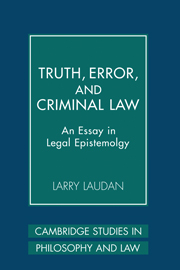Crossref Citations
This Book has been
cited by the following publications. This list is generated based on data provided by Crossref.
Beltrán, Jordi Ferrer
2006.
LEGAL PROOF AND FACT FINDERS' BELIEFS.
Legal Theory,
Vol. 12,
Issue. 4,
p.
293.
Dekker, Sidney W. A.
2007.
CRIMINALIZATION OF MEDICAL ERROR: WHO DRAWS THE LINE?.
ANZ Journal of Surgery,
Vol. 77,
Issue. 10,
p.
831.
Cáceres, Enrique
2007.
A constructivist model for the judicial determination of facts.
p.
285.
Dekker, Sidney W. A.
2007.
Eve and the Serpent: A Rational Choice to Err.
Journal of Religion and Health,
Vol. 46,
Issue. 4,
p.
571.
Schauer, Frederick
2008.
In Defense of Rule-Based Evidence Law–and Epistemology Too.
Episteme,
Vol. 5,
Issue. 3,
p.
295.
Schauer, Frederick
2008.
In Defense of Rule-Based Evidence Law: And Rule-Based Epistemology Too.
SSRN Electronic Journal,
2008.
The Judicial Assessment of Expert Evidence.
p.
180.
Allen, Ronald J.
2008.
Explanationism All the Way Down.
Episteme,
Vol. 5,
Issue. 3,
p.
320.
Dekker, Sidney W. A.
2009.
Just culture: who gets to draw the line?.
Cognition, Technology & Work,
Vol. 11,
Issue. 3,
p.
177.
Laudan, Larry
and
Mayo, Deborah G.
2009.
Error and Inference.
p.
376.
Novani, Sergio
2010.
What is Reasonable Doubt?.
SSRN Electronic Journal,
Woods, John
2010.
Approaches to Legal Rationality.
p.
217.
2010.
Fact-Finding without Facts.
p.
334.
Novani, Sergio
2010.
Reasonable Doubt: A Particular Conception.
SSRN Electronic Journal,
2010.
Data Analysis in Forensic Science.
p.
347.
2012.
The Internationalisation of Criminal Evidence.
p.
199.
Tucker, Aviezer
2012.
Scarce justice.
Politics, Philosophy & Economics,
Vol. 11,
Issue. 1,
p.
76.
Laudan, Larry
2012.
Eyewitness Identifications.
Perspectives on Psychological Science,
Vol. 7,
Issue. 3,
p.
272.
Chalmers, James
and
Leverick, Fiona
2012.
‘Substantial and Radical Change’: A New Dawn for Scottish Criminal Procedure?.
The Modern Law Review,
Vol. 75,
Issue. 5,
p.
837.
Spencer, Bruce D.
2012.
When Do Latent Class Models Overstate Accuracy for Diagnostic and Other Classifiers in the Absence of a Gold Standard?.
Biometrics,
Vol. 68,
Issue. 2,
p.
559.



